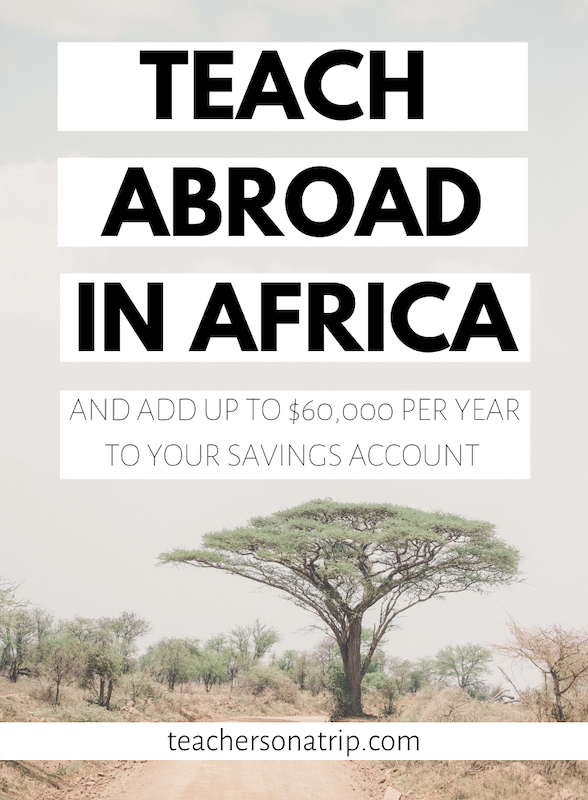
How to Teach Abroad in Africa
Teaching abroad is all about gaining insight to other cultures, ways of life, and environments. Africa is an excellent place for many people to visit to gain this worldly understanding. It is so vastly different from every other continent on our earth. But why are people moving to Africa to teach abroad? The pay is competitive and the benefits are amazing. They allow you to put multiple thousands of dollars into your savings account each year. I give a ton of insight of how to teach abroad in Africa in my online e-course, The Beginner’s Guide to Teaching Abroad. But first, let’s go over some basics.
Who Can Teach in Africa?
There are job opportunities for both certified and non-certified teachers. But there are some big differences between the styles of teaching. So which type is best for you?
Certified Teachers
Certified teachers have more job opportunities, better pay, and typically teach in better schools. This is because international schools have strict requirements and expectations. If you’re not certified, it is unlikely that you teach inside of an international school. The exception is if the school cannot get enough certified teachers to employ. They might look at hiring un-licensed teachers to keep their school running.
I do not recommend applying to an international school if you are uncertified. But if you do, you should be prepared to work in a school that has difficulty maintaining quality teachers due to low salary, unsafe areas, bad management, or lack of classroom resources. Of course this is a generalization, and I cannot confirm that all the schools follow these guidelines. But this is definitely true for a majority of international schools. Curious how to start looking an applying for international schools? Check out The Beginner’s Guide to Teaching Abroad. I take you through the entire process, step-by-step, so you can start teaching overseas.
Uncertified Teachers
So how do uncertified teachers work in Africa? You’ll need a different path. TEFL certifications are the best way to go. TEFL teachers have options of teaching inside and outside of schools. Some teachers get employed as an English teacher inside a school setting. This can look different for everyone. Some TEFL teachers conduct their own classroom teaching students English. Other teachers pull students out and give individual help. TEFL teachers can also teach outside of a school setting as tutors for both children and adults. Some TEFL teachers even work in small language schools which are a bit of a mix between the both.
These jobs typically do not have the benefits that an international school has. But TEFL certifications are a much more affordable option than becoming a certified teacher. If you Google “TEFL Companies”, you will be drowned with too much information. There are so many different TEFL courses out there, and you cannot trust them all. I recommend always finding one that is accredited and at least 120-hours. Anything less, and your potential employers may choose someone with more experience and training.
Here is a list of my personal favorite TEFL certification courses. Some of these companies have both in-person and online TEFL Certification programs. So feel free to pick whichever works best for you and your needs!
-
International TEFL Academy
- International TEFL Academy is a well-respected, accredited organization that certifies around 6,000 students each year. All of their professors have their Masters or Doctorate degrees, so you know you’re getting a quality education. Although more expensive that the other options, this is the one to go with if you have the money. Employers will look at your resume and know you’ve been trained by one of the best!
-
ITTT (International TEFL and TESOL Training)
- ITTT is also an accredited and highly rated organization. Although not as big of a name as International TEFL Academy, it is still a great company and a much more affordable option! ITTT has a 60-hour course that you might be tempted to take. But I do not recommend doing anything less than the 120-hour course. You can click on the link above to save 5% off your enrollment fee.
-
Premier TEFL
- Premier TEFL is another great option for an accredited and highly rated organization. They also have many different course options which can help narrow your niche (if you have one) and gain more training in your field.
-
Maximo Nivel
- Can you guess what I’m going to say? Maximo Nivel is accredited and highly rated. I wouldn’t recommend anything that wasn’t. They are a smaller business that really cares about you! You get personalized attention, however, they primarily specialize in Central American countries. So if Africa is calling your name, Maximo Nivel might not be for you. However, if you decide that it is, mention that Teachers on a Trip recommended you in the notes section of your checkout and you’ll receive a free gift from us!
Salary and Savings in Africa
Africa is a one-of-a-kind continent. Many people are drawn to it because of the wildlife, history, and connection with nature. But a huge selling point for teachers who want to work in Africa is the salary. As I mentioned before, international schools pay much better than TEFL schools. Africa is a prime example of this. Most of the salaries are tax-free and the benefits are so amazing that your savings potential goes up!
Salary
- Highest salary: $85,178 USD
- Lowest salary: $18,000 USD
- Average salary: $41,452 USD
If you’re thinking, “I get paid way more than that where I’m at now.” then you’ll want to keep reading!
Benefits
Although the salary doesn’t appear abnormally special, the benefits are what allow you to save so much! Most, if not all, international schools in Africa pay for your housing, utilities, and flights. I think we can all agree that rent takes up the most of our budget. I’m paying $2,300/month on a small island and would love for my school to be paying for it. But many schools offer way more than just housing.
List of benefits offered by schools in Africa:
- Housing- Some schools own an apartment complex that all the teachers live in. Other schools will give you a set allowance per month to cover your rent. Almost all housing that comes from international schools come fully furnished!
- Utilities- If living in an apartment complex, you’ll never see a bill! If your school gives you an allowance each month for your rent, they’ll also add in enough to cover utilities.
- Flights- Most schools provide flights home and back each year. Some schools will even pay for your flights around the holidays as well!
- Moving allowances- Schools will give you different stipends to cover moving expenses. A “moving allowance” typically covers flights and any other expenses occurred while physically moving to a new country. A “settling-in stipend” is a one-time payment from the school that helps you cover things like deposits, opening a bank account, and furniture (if needed.) A “storage allowance” can be given to allow you to keep your belongings in a storage unit in your home country while you’re away. And finally, a “shipping allowance” allows you to ship any items or belongings to your new home. All of these are perks of teaching in an international school, and although some schools only provide 1-2 of these allowances, some provide them all!
- General Fees- Some schools will cover the cost of your visa fees, vaccination fees, or other payments necessary to move to Africa.
- Retirement- Different schools supply different amounts to your retirement fund. These can typically be cashed out when you leave the school and put into your account back home.
- Insurance- Schools will pay a good percentage of your medical, dental, and optical insurance.
- Bonuses- Some schools will offer a $2000+ bonus for each year you complete at your school.
- Personal Allowances- Some schools will give you a professional development allowance and even a R&R allowance in some schools.
The benefits of the school are always what you want to focus on. Even if you’re getting paid $30,000/year, you could still be adding $20,000 to your savings account each year if the school supplies good benefits.
Potential Savings
- Highest potential savings: $60,000 USD
- Lowest potential savings: $3,000 USD
- Average potential savings: $19,427 USD
Mathematically, the higher the salary and benefits combined, the higher your potential savings. But on occasion, there are schools that offer a competitive salary but no benefits. Meaning you need to take a look at the potential savings in each location to determine your finances in a region.
Safety
Depending on your location in Africa, you could be worried about safety. It’s not fair or easy enough to say “Africa is dangerous” because Africa is such a large continent filled with many different people, cultures, religions, and ideas. The number one thing I tell all my students in The Beginner’s Guide to Teaching Abroad is to check out current events on Google. Is there a civil war happening? Or maybe your dream location just suffered from a huge economic collapse? It’s important to know these things because safety is your number one priority. If refugees and asylum seekers are fleeing their countries, then it might not be a good place for you yet.
You can always check back in 5 years down the line and see how the political climate is! And if you are wondering whether your potential school is located in a safe place, I recommend checking Glassdoor and typing in the school name. Many teachers who have worked at that school (or are still currently working) will post the pros and cons of their experience and many also include the safety of the region!
Some schools in Africa that provide a housing unit or apartment complex also provide enhanced security if it is located somewhere that suffers from looting or theft. Enhanced security can include iron bars or gates, a security personnel, and frequent locks. This is a great question to ask your potential employers if you still remain unsure.
Famous Landmarks and Travel Destinations
One of the big perks for teachers to work abroad is to be able to travel. So what kind of beautiful locations can you easily access during your time in Africa? Use some of your large savings to invest in experiences of a lifetime while you are there!
- The Avenue of Baobabs, Madagascar
- Chefchaouen, Morocco
- Fish River Canyon, Namibia
- Gorilla Tracking in Volcanoes National Park, Rwanda
- The Great Pyramids of Giza, Egypt
- Kruger National Park, South Africa
- Lalibela Rock-Hewn Churches, Ethiopia
- Maasai Mara National Reserve, Kenya
- Makgadikgadi Salt Pans, Botswana
- Medina of Marrakech, Morocco
- Mount Kilimanjaro, Tanzania
- Ngorongoro Crater, Tanzania
- The Nile River, Egypt
- Okavango Delta, Botswana
- Olduvai Gorge, Tanzania
- The Omo National Park and River Valley, Ethiopia
- Reunification Monument, Cameroon
- Sahara Desert, Morocco
- Serengeti National Park, Tanzania
- Sossusvlei, Namibia
- Table Mountain, South Africa
- Timbuktu, Mali
- The Valley of the Kings, Egypt
- Victoria Falls, Zimbabwe
- Zanzibar, Tanzania
Related Articles: How to Teach Abroad, How to Teach Abroad in the Caribbean, Teaching Abroad in Grand Cayman, Teaching Abroad in Ecuador, Teaching Abroad in South Korea
If you’ve decided you would like to learn more about how to teach abroad in Africa, then you should consider joining The Beginner’s Guide to Teaching Abroad. I show you step-by-step how to apply and get a job in some of the best international schools in the world! Or you can download my free video about the benefits of teaching abroad below.



